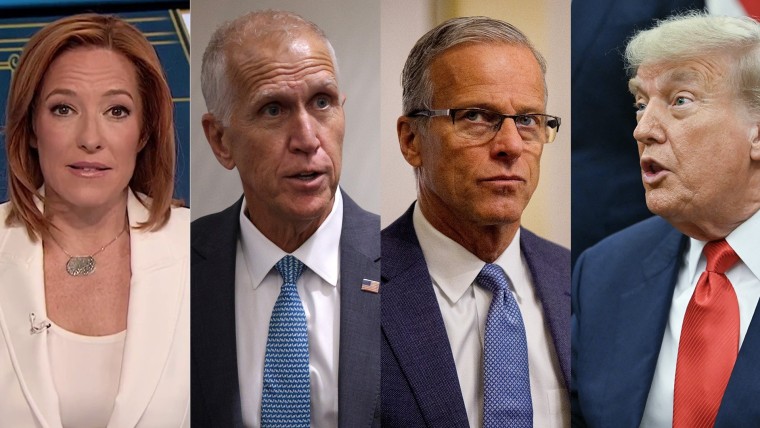If China’s leaders were sitting around plotting ways to undermine America’s long-term economic competitiveness and gave Chinese companies a leg up in developing the technologies of the 21st century, it’s quite possible — even likely — they would do precisely what Senate Republicans voted to do Tuesday.
Ever since Donald Trump took office in January, his administration has taken a sledgehammer to America’s global competitive edge, but as the details continue to be hammered out for the president’s “big, beautiful bill,” the GOP-controlled Congress is on the verge of committing national suicide.
Clean energy technology has been one of the fastest-growing manufacturing sectors of the economy. The GOP bill would cripple it.
DOGE cuts to federal agencies responsible for scientific research — such as the National Science Foundation and the National Institutes of Health — are already threatening America’s hard-fought edge in fields such as vaccine development, artificial intelligence and quantum computing. But this bill, more directly, would wreck the U.S. economy. According to a recent study by economists at American University, “a 25% cut to public R&D spending would reduce GDP by an amount comparable to the decline in GDP during the Great Recession.”
The Trump administration’s assault on higher education, including its ongoing (and likely illegal) war against Harvard University, is chipping away at one of America’s key exports and the crown jewel of its education system — the nation’s colleges and universities. Waves of mass deportations are already making America a less welcoming place for immigrants, who have for generations added creativity and entrepreneurship to the American economy (Trump’s policies have already blown a $12 billion hole in the U.S. tourism industry).
Meanwhile, the evisceration of the U.S. Agency for International Development (which, to little fanfare, permanently closed this week) will fatally undermine American soft power, which was once considered one of the most significant advantages of U.S. foreign policy.
Undeterred by the catastrophic damage of these spending cuts, the Republican-controlled Senate is poised to deliver the death blow.

To pay for nearly $5 trillion in tax cuts that overwhelmingly benefit the wealthiest Americans, the Senate version of the bill would cut more than $1 trillion from the Medicaid program. An estimated 11.8 million Americans would lose access to health insurance, some rural hospitals and nursing homes would close and an unknown number of our fellow citizens would die as a result. Additional possible cuts to Obamacare subsidies could significantly increase the number of uninsured Americans.
One might imagine that moral qualms would be sufficient reason to oppose such a self-destructive move, but from an economic standpoint, taking away health care from millions would mean more sick Americans (both physically and mentally), which would lead to diminished productivity, less entrepreneurship and worse economic growth.
In recent years, clean energy technology has been one of the fastest-growing manufacturing sectors of the U.S. economy. The GOP bill would cripple it. Hundreds of billions of dollars in cuts in solar and wind subsidies would devastate both industries. The Senate phased out a tax credit for electric vehicles, which would do untold damage to the industry (with the phase-out happening on September 30, drivers have only a few months to buy an EV before the subsidy expires).
As bad as you might have heard the bill is, in reality, it’s actually worse.
In the near term, millions of jobs could disappear and energy prices would likely increase. Over the long term, clean energy companies, as well as manufacturers of batteries and wind turbines, makers of computer chips, parts for electric cars and other components of the clean energy economy, could either cancel new investments or relocate overseas. No industry can plan effectively for the future when Congress keeps changing the rules.
The failure to address climate change will, of course, have a long-term catastrophic impact. Rather than preparing the United States for the reality of a warmer planet, the GOP bill would invest billions more in dirty energy sources such as gas and coal that make global warming worse. The U.S. will still be buffeted by major weather events, made worse by climate change. And giving away trillions in tax cuts to rich Americans would make it that much harder for the U.S. to deal with those disasters.
As if all this isn’t enough, the “big, beautiful bill” would reduce food stamp benefits, which would increase poverty, but also do lasting damage to the poorest and most vulnerable Americans.

As bad as you might have heard the bill is, in reality, it’s actually worse. Americans will die needlessly, millions of others will see their quality of life crater and their children will face a future of needless suffering and diminished opportunities. Piece by piece, Republicans in Congress are chipping away at the policies and institutions that not only have defined America, but also have allowed it to become the world’s true economic powerhouse.
It’s not often a great power chooses to willingly shoot itself and do untold damage to its future. But this is precisely what is happening on Capitol Hill right now.
On Jan. 19, 2025, Americans could squint and still see their nation as a great and innovative power well-positioned to compete in the global economy of the 21st century. If the “big, beautiful bill” passes the House of Representatives — and most likely, it will — no one will see a great power when they look at America.

